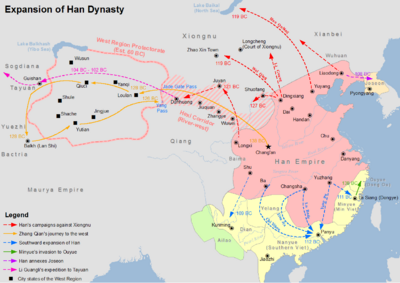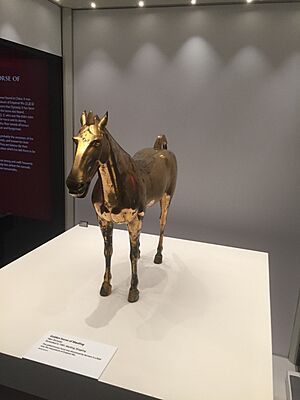War of the Heavenly Horses facts for kids
Quick facts for kids War of the Heavenly Horses |
|||||||
|---|---|---|---|---|---|---|---|
 |
|||||||
|
|||||||
| Belligerents | |||||||
| Han dynasty |
|
||||||
| Commanders and leaders | |||||||
|
Wugua Jianmi |
||||||
| Strength | |||||||
| 1st (104 BC): 20,000 infantry 6,000 cavalry 2nd (102 BC): 60,000 infantry 30,000 cavalry 100,000 oxen 20,000 donkeys and camels |
|
||||||
The War of the Heavenly Horses (also called the Han–Dayuan War) was a big fight between the Chinese Han dynasty and a kingdom called Dayuan. Dayuan was located in the Ferghana Valley, which is in Central Asia today. This war happened in 104 BC and again in 102 BC.
The main reason for the war was that the Han Emperor wanted special, fast horses from Dayuan. These horses were known as "heavenly horses." The Han dynasty needed these strong horses to improve their army, especially to fight against the Xiongnu nomads. The war ended with a Han victory, which helped the Han dynasty become more powerful in Central Asia.
Contents
Why the War Started: The Heavenly Horses
Emperor Wu's Desire for Special Horses
Emperor Wu of Han wanted to defeat the Xiongnu, who were a group of nomadic people. They had been bothering the Han dynasty for many years. In 139 BC, the Emperor sent a diplomat named Zhang Qian to explore the lands to the west. Zhang Qian's job was to find allies against the Xiongnu.
During his journey, Zhang Qian heard about the amazing "heavenly horses" of Dayuan. These horses were famous for their speed and strength. He told the Emperor about them when he returned. The Emperor believed these horses would make the Han cavalry much stronger.
Dayuan and Its People

The people of Dayuan lived in many walled cities. They grew crops like rice and wheat, and they made wine from grapes. Dayuan was one of the farthest western states that sent messengers to the Han court.
However, the Dayuan people were very proud and didn't follow the Han customs. They thought they were too far away for the Han army to reach them. They also respected the Xiongnu, who were powerful neighbors. Han messengers often had a hard time getting supplies in Dayuan. They were charged very high prices for food and horses.
The Broken Deal and Han Anger
Emperor Wu sent a trade mission to Dayuan. They brought 1,000 pieces of gold and a golden horse to buy the "heavenly horses." But Dayuan had already been trading with the Han for a while. They had plenty of Han goods and had even learned how to make coins and weapons from the Han.
So, Dayuan's leaders refused the offer. They said the Han army was too far away to be a threat. They also said their horses were too valuable to sell. The Han envoys got angry and smashed the golden horse they had brought. This made the Dayuan nobles furious. They ordered a nearby city, Yucheng, to attack and kill the Han envoys and steal their goods.
When Emperor Wu heard about his envoys being killed, he was very angry. He decided to send an army to punish Dayuan. He chose General Li Guangli, whose sister was the Emperor's favorite concubine, to lead the army. Li Guangli's first army had 6,000 cavalry and 20,000 foot soldiers. Many of these soldiers were young men from border areas.
First Expedition: A Difficult Journey (104 BC)
In the autumn of 104 BC, General Li Guangli began his march towards Dayuan. His army had to cross the Tarim Basin and the Taklamakan Desert. These were very harsh lands. Along the way, Li's army needed supplies from the small oasis states.
However, some of these states refused to help. Li's army had to fight them, but they couldn't always win. If a fight lasted too long, the army had to move on without getting supplies. Because of these many small battles, the army became tired and ran out of food.
By the time they got close to Dayuan, Li had lost too many soldiers. They were defeated at Yucheng. Li realized his army wasn't strong enough to capture Dayuan's capital, Ershi. So, he decided to retreat back to Dunhuang.
Second Expedition: A Stronger Force (102 BC)
Some officials wanted to stop the war and focus on fighting the Xiongnu. But Emperor Wu didn't want to give up. He feared that failing to defeat Dayuan would make the Han look weak to other western states. So, he gave Li Guangli a much bigger army and more supplies.
In the autumn of 102 BC, Li set out again. This time, he had 60,000 soldiers, many of whom were "bad boys" (penal recruits and mercenaries). He also had 30,000 horses and a huge number of supply animals. These included 100,000 oxen and 20,000 donkeys and camels. This time, the army had plenty of supplies. They had no trouble with the oasis states.
Most of the oasis states in the Tarim Basin surrendered without a fight when they saw the powerful Han army. Only one state, Luntai, resisted. Li Guangli attacked Luntai and massacred its people. Even with good supplies, Li still lost half his army to the tough land and soldiers running away. This happened by the time they reached Dayuan.
Siege of Ershi and Dayuan's Surrender
When Li's army arrived at Ershi, the capital of Dayuan, they immediately began a siege. Dayuan's cavalry tried to fight them in a big battle, but the Han crossbowmen easily defeated them. Han engineers then diverted the river that flowed through Ershi, cutting off the city's water supply.
After a 40-day siege, the Han army broke through the outer wall. They captured the enemy general, Jianmi. The Dayuan nobles retreated behind the inner walls. They decided to surrender. First, they killed their own king, Wugua. Then, they offered Li all the horses he wanted and supplies. They promised to kill all their horses if he didn't accept.
Li agreed to their terms. He took about 3,000 horses and plenty of food. Before leaving, Li made one of the Dayuan nobles, Meicai, the new king. Meicai had been kind to the Han envoys before.
The Journey Back and Rewards
As Li Guangli headed back to Dunhuang, he realized that the local areas couldn't feed his entire army. So, the army split into several groups, taking different routes. One group, about 1,000 men, tried to take Yucheng. But the people of Yucheng fought back with 3,000 men and defeated them.
A few Han soldiers escaped and told Li about the defeat. Li sent another general, Shangguan Jie, to attack Yucheng. When the king of Yucheng saw the large Han army, he fled to another kingdom called Kangju. Yucheng then surrendered. When Kangju heard that Dayuan had been defeated, they handed the king of Yucheng over to Shangguan, who had him executed.
The Han army faced no more resistance on their way back to Yumen Pass. When the rulers of other oasis states heard about Dayuan's defeat, they sent their family members with the Han army back to the Han capital. There, they gave gifts to Emperor Wu and stayed as hostages.
Even though the second expedition was a success, there was a lot of corruption. Li's generals and officers didn't care for their soldiers, who were mostly from prisons. They held back food, causing many soldiers to run away. Because of this, Li returned with only 10,000 men and 1,000 horses fit for military service. Still, Emperor Wu considered this a victory and rewarded those who survived. Li Guangli became a Marquis.
What Happened Next
About a year later, the nobles of Dayuan got together and killed King Meicai. They blamed him for all the trouble with the Han. Wugua's brother, Chanfeng, became the new king. Chanfeng didn't want to upset the Han, so he sent his son as a hostage to the Han court. The Han sent gifts to the new ruler, and peace was made with Dayuan.
Ten years later, General Li Guangli was defeated by the Xiongnu. He ended up joining their side. He married the Xiongnu leader's daughter but was later executed because of a conflict with another Han defector.
More to Explore
- Han dynasty in Inner Asia
- Han–Xiongnu War
 | Chris Smalls |
 | Fred Hampton |
 | Ralph Abernathy |


